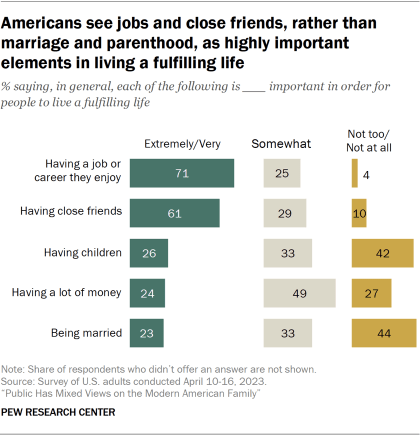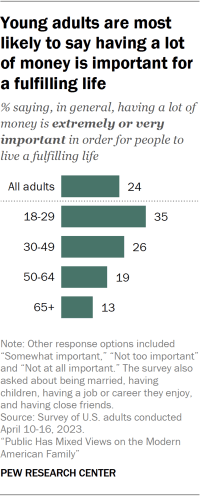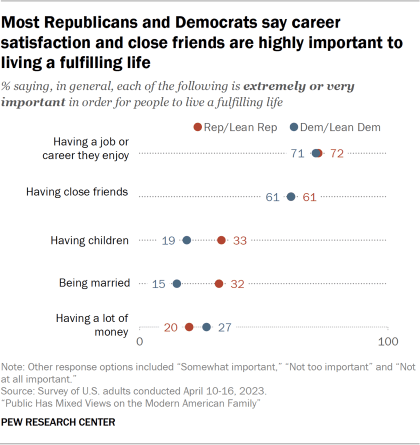When asked what it takes to lead a fulfilling life, the public prioritizes job satisfaction and friendship over marriage and parenthood. Some 71% of all adults say having a job or career they enjoy is extremely or very important in order for people to live a fulfilling life. And 61% say having close friends is equally important.

Only about one-in-four adults say having children (26%) or being married (23%) is extremely or very important in order to live a fulfilling life. A third say each of these is somewhat important. And 42% and 44%, respectively, say having children or being married is not too or not at all important.
Having a lot of money is viewed as extremely or very important for a fulfilling life by 24% of adults, while another 49% say this is somewhat important. About one-in-four adults (27%) say this is not too or not at all important.
Gender
When it comes to what leads to a fulfilling life, men and women have similar views of the importance of having close friends and having a lot of money.
Women place a little more importance on job or career enjoyment than men do (74% vs. 69%). At the same time, men place somewhat more importance on marriage and having children. Some 28% of men, compared with 18% of women, say being married is extremely or very important for a fulfilling life. Similarly, 29% of men versus 22% of women say the same about having children.
Marital status and parenthood
Not surprisingly, married adults are more likely than those who are unmarried to say marriage is important in order to live a fulfilling life. About three-in-ten married adults (29%) say being married is extremely or very important for a fulfilling life. This compares with 18% of those who are divorced, separated or widowed, 15% of those who have never been married, and 12% of those who are living with a partner. Still, married people place much greater importance on job satisfaction and having close friends than they do on being married.
Similarly, parents are more likely than adults without children to say having children is important for a fulfilling life. About three-in-ten parents with children of any age (31%) say having children is extremely or very important, compared with 18% of adults who do not have children.
Race and ethnicity
Adults across racial and ethnic groups place the highest importance on having a job or career they enjoy in order to live a fulfilling life. But White (66%) and Asian adults (65%) are more likely than Hispanic (51%) or Black adults (46%) to say having close friends is extremely or very important.
In turn, Black (39%), Hispanic (33%) and Asian adults (49%) are more likely than White adults (16%) to say having a lot of money is highly important.

Age
Across age groups, older adults (ages 65 and older) are the most likely to say having an enjoyable job or career is extremely or very important for a fulfilling life (78% say this). Still, 67% to 73% of other age groups say the same. Adults ages 65 and older also place a higher value on being married than younger age groups do.
Younger adults (ages 18 to 29) are more likely than other age groups to say having a lot of money is extremely or very important for a fulfilling life: 35% say this, compared with about one-in-four or fewer among older age groups.
Partisanship

Roughly equal shares of Republicans and Democrats say having an enjoyable job or career and having close friends are highly important when it comes to living a fulfilling life. And both groups prioritize these things over marriage and having children.
Republicans are more likely than Democrats to say having children and being married are extremely or very important. Democrats place somewhat more importance than Republicans on having a lot of money.




